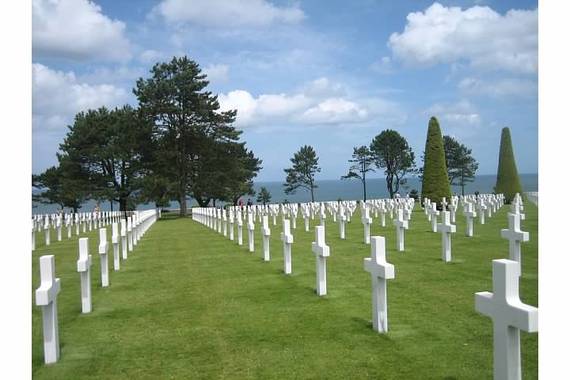I thought our room was on the first floor. She said premier étage, didn't she? Why do we need the elevator? Because in France, the first floor is on the second floor. We talked about it in class, but now you'll remember.
Our coach puts dozens of kilometers of narrow country roads behind us, weaving past stone buildings in various states of disrepair. They've been here for centuries -- long before World War II came close to obliterating them all. Houses, barns, stables, outbuildings, storage sheds, churches. Some appear to have come through the war unscathed, their bucolic charm intact. Others lie in pieces, barely recognizable under gold and milky lichen, thick grasses and specks of blue spring wildflowers. Who were the people who lived here during the war? French country homes are rarely sold, customarily passed down through families, so it's likely those who live here now, lived here in the 1940s, or at least their forebears did. Stories of Allied sacrifice and bravery were shared across generations, thus, many yards fly both French and American flags.
Madame Bohr, it feels like we're at the seashore. We ARE at the seashore. We're in Normandy, close to the D-day BEACHES. Don't you remember what Nathalie told us and what we discussed this morning? D-day, Jour-J to the French, took place on the English Channel, La Manche. You'll see where the battles were fought as soon as we get off the bus.
I find the beaches of Northern France melancholy by nature: cold, gray, rocky. Add the D-day landings and my heart wants to break. There's salt in the air, and humidity. Remarkable humidity. Seagulls scream overhead. The landscape at Pointe du Hoc, virtually untouched since 1944 and pockmarked with deep bomb craters, is dotted with dense, low-slung bushes of tightly packed yellow beach blooms. A tiny ginger-breasted European robin twitches its head in the brush, trilling morning song. The inexorable persistence of nature on such a blood-soaked bluff. Do my spring-breakers understand what happened here seventy years ago? For that matter, do I or any of us truly understand?
It's an emotionally gloomy day, despite blue skies and a crisp wind. We arrive at the Normandy American Cemetery and the yellow roses have changed to spiky mauve and burgundy heather. I've visited this sacred spot multiple times, yet it never fails to make me cry. How could it not? Seeing the black and white photographs of the fresh, young faces of men - boys, actually - displayed on the walls of the Visitors Center is all it takes. I reiterate Nathalie's suggestion that each student find a soldier from Maryland, or the state in which he or she was born, take a picture of the grave marker and research him when they return home. Say a prayer, be grateful, say thank you to him and his family.
They gaze out over Omaha Beach to the English Channel and I wonder what they're thinking, dreaming. Are they imagining a war that seems so very long ago? What was I thinking at their age? As I recall, it was always about the future. About all that lay ahead. Life yet to unfold. Now, however, with decades and so many of life's major decisions behind me, I'm in the present, appreciating the privilege of sharing history with students, watching it come alive in their eyes. As we stand on this promontory where what happened changed the world, my wish for my charges, as it is for my children: put the important things in relief and let the trivial falls aside. Appreciate what they have and what was secured for them on this cliff in France.
***
The end of our nine-day trip looms.
There has been plenty of hilarity and silliness followed by moments of reflection and illumination. I was enchanted, smitten, after my first taste of France. Have my students fallen in love as well? Have they caught the very same Francophile bug?
Are we taking the metro or the RER into Paris? Bravo! You know the difference.
Our final evening in Paris. A cruise on the Seine. Notre Dame soars, the river banks crawl with revelers, the Eiffel Tower glitters. My students shout with glee, their voices echoing, each time we glide under one of Paris' many bridges.
I've never laughed so hard. I can't believe I ate chicken liver. I really can't believe I actually liked it! This is the best meal I've ever had. I'll remember this trip for the rest of my life. I'll never forget how beautiful Paris is. I'm so sad we leave tomorrow. I want to stay. When I come back to France...
French music to my ears.
